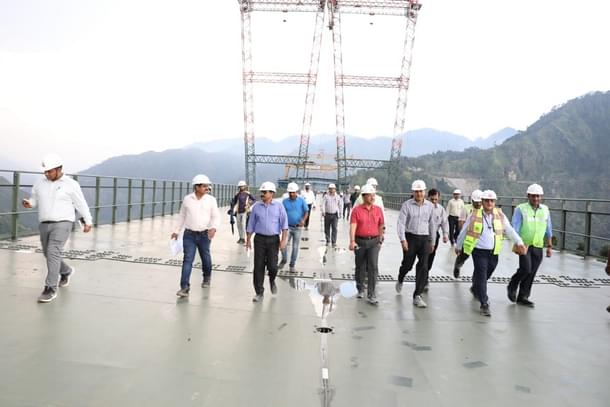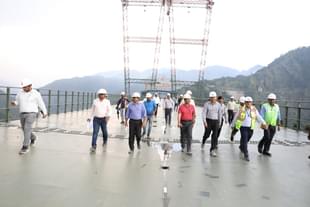Infrastructure
Kashmir Rail Link Project Slated For Completion In February 2024
Arun Kumar Das
May 16, 2023, 10:30 AM | Updated 10:29 AM IST
Save & read from anywhere!
Bookmark stories for easy access on any device or the Swarajya app.


Barring 200 metre work in two tunnels between Banihal and Katra, most of the work of the Kashmir rail link project is complete now and the project is expected to be completed in February 2024.
"Excavation work is being carried out in the Tunnel-1 and Tunnel-13 in the 111 km long Katra-Banihal section of the Udhampur-Srinagar-Baramulla Rail Link (USBRL) project. The project is destined for completion in February 2024 as announced by the Railway Minister on his visit to Chenab Bridge," said Northern Railway General Manager Shobhan Chaudhuri.
The USBRL is a National project undertaken by the Indian Railways for construction of a broad-gauge railway line through the Himalayas, with the aim of connecting the Kashmir region with the rest of the country.
The all-weather, comfortable, convenient and cost effective mass transportation system will be the catalyst for the overall development of the northernmost alpine region of the country.
Construction of the first three phases of the project has been completed and the line is in operational use for running of trains between Baramulla-Banihal in Kashmir valley and Jammu-Udhampur-Katra in Jammu region.
Work on the 111 km section Katra-Banihal, the most arduous and treacherous portion due to its geology and extensive riverine system replete with deep gorges, is ongoing. There are several iconic bridges and tunnels coming up in this section. Most of the rail track is slated to be in tunnels or bridges in this section.
Addressing his first press conference after joining as General Manager Northern Railway in April 2023, Chaudhuri presented the achievements of NR of the last financial year.
Spanning across seven states and two UTs, Northern Railway has five divisions and 1,011 stations with over 1,926 trains running in the zone per day.
Sharing the future plans of the zone, he said the focus is safety, punctuality, increasing the share of goods transportation and creation of infrastructure.
The GM also emphasised on energy efficiency, shifting from diesel to electric system in train operations and concern for the environment which includes harnessing solar energy and water recycling and rainwater harvesting.
On increasing the speed of trains the GM said that portions of track on which the trains are to be operated at high speed will be provided with boundary walls to prevent crossing of tracks by cattle and humans.
Manned level crossings are being replaced with ROBs/ RUBs to facilitate smooth movement of rail and road traffic. Northern Railway is also going to run a hydrogen train in the heritage Kalka-Shimla section. This will reduce pollution in the fragile Himalayan ecosystem.
Arun Kumar Das is a senior journalist covering railways. He can be contacted at akdas2005@gmail.com.




